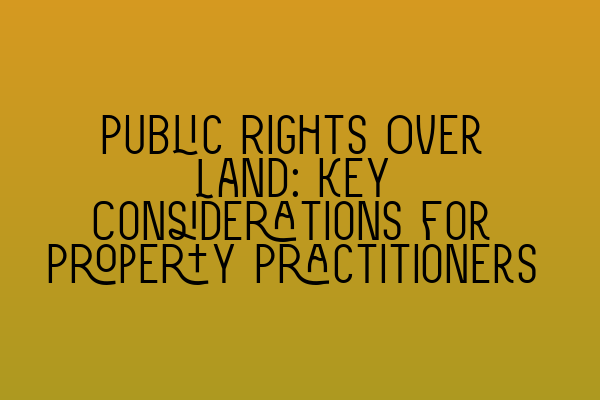Public Rights Over Land: Key Considerations for Property Practitioners
When it comes to property law, practitioners must navigate a complex web of legal rights and regulations. One area that requires careful attention is public rights over land. Understanding these rights is crucial for any property practitioner to provide effective advice and representation to clients.
In this blog post, we will explore the key considerations for property practitioners regarding public rights over land, including the types of public rights, the legal basis for these rights, and how they can affect property transactions. So, let’s dive right in!
1. Types of Public Rights Over Land
Public rights over land can take various forms, each with its own implications for property owners. Three common types of public rights to be aware of are:
a) Right of Way: The right of way grants individuals or groups the legal right to pass through a particular piece of land. This can be for foot traffic, vehicles, or both. The rights of way can be public or private, and they can exist by prescription or by express grant.
b) Right to Access: Similar to the right of way, the right to access provides individuals with the right to enter and use a specific piece of property. This includes access to common areas or amenities shared by multiple property owners, such as parks, beaches, or roads.
c) Rights to Water: These rights include access to rivers, lakes, or other bodies of water. They can involve fishing rights, rights to water abstraction, or rights related to water quality and usage. Water rights can be complex, as they often involve both public and private interests.
2. Legal Basis for Public Rights Over Land
Public rights over land are typically established and regulated by statutory law. The specific legislation governing these rights may vary depending on the jurisdiction and the nature of the right. For example, in England and Wales, the rights of way are primarily governed by the Highways Act 1980.
It is crucial for property practitioners to have a sound understanding of the relevant legislation and case law regarding public rights over land to effectively advise their clients. This includes staying updated on any recent legal developments that may impact these rights and their implications for property transactions.
3. Impact on Property Transactions
Public rights over land can significantly impact property transactions, particularly when it comes to land use, planning permissions, and development. For example, a right of way cutting across a property may restrict certain types of development or require additional negotiations with affected parties.
It is essential for property practitioners to conduct thorough due diligence checks to identify any public rights over land that may affect their clients’ properties. This includes researching local authorities’ records, consulting with experts such as land surveyors, and examining historical documents that may indicate the existence of public rights.
4. Resolving Disputes
Disputes involving public rights over land can arise between property owners and members of the public seeking to enforce their rights. These disputes can be complex and contentious, requiring skilled negotiation and, in some cases, litigation to resolve.
Property practitioners play a vital role in assisting their clients in resolving disputes related to public rights overland. This includes providing legal advice, conducting negotiations, and representing clients in court if necessary. Engaging the services of an experienced property solicitor is crucial for individuals involved in or affected by such disputes.
Conclusion
Public rights over land are a complex and nuanced aspect of property law that requires careful consideration from property practitioners. Understanding the different types of public rights, knowing the legal basis for these rights, and recognizing their implications for property transactions are key considerations for any practitioner in this field.
By staying informed about the legislation and case law surrounding public rights over land and conducting thorough due diligence, property practitioners can effectively advise their clients on potential benefits and risks associated with these rights.
If you’re planning to pursue a career in property law or are studying for the SQE exams, check out the related articles linked below. They provide valuable resources to help you prepare and succeed in your journey:
– SQE 1 Practice Exam Questions: Test your knowledge and sharpen your skills with these practice questions for the SQE 1 exam.
– SQE 1 Practice Mocks FLK1 FLK2: Get familiar with the format and structure of the SQE 1 exam by attempting these practice mocks.
– SQE 2 Preparation Courses: Enhance your understanding of property law and other key areas with specialized courses designed specifically for SQE 2 preparation.
– SQE 1 Preparation Courses: Build a solid foundation in property law and other areas tested in the SQE 1 exam with comprehensive preparation courses.
– SRA SQE Exam Dates: Stay updated on the upcoming exam dates for the SRA SQE exams and plan your preparation accordingly.
Remember, being well-informed and prepared is the key to success in the field of property law. Good luck on your journey to becoming a proficient property practitioner!
